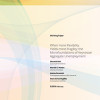In this work we develop a set of labour market and fiscal policy experiments upon the labour and credit augmented “Schumpeter meeting Keynes” agent-based model. The labour market is declined under two institutional variants, the “Fordist” and the “Competitive” setups meant to capture the historical transition from the Fordist toward the post “Thatcher- Reagan” period. […]




